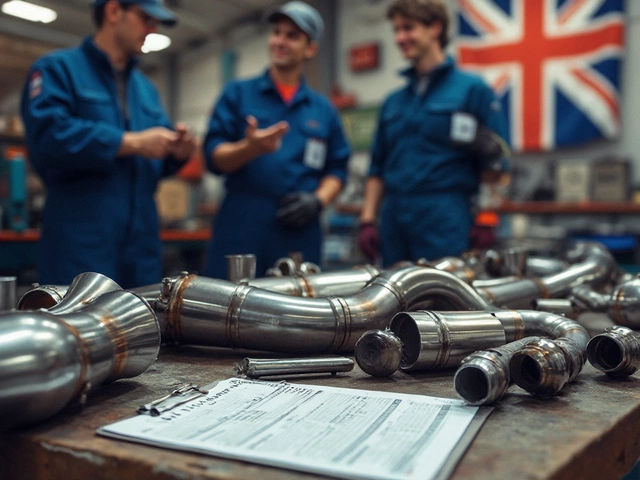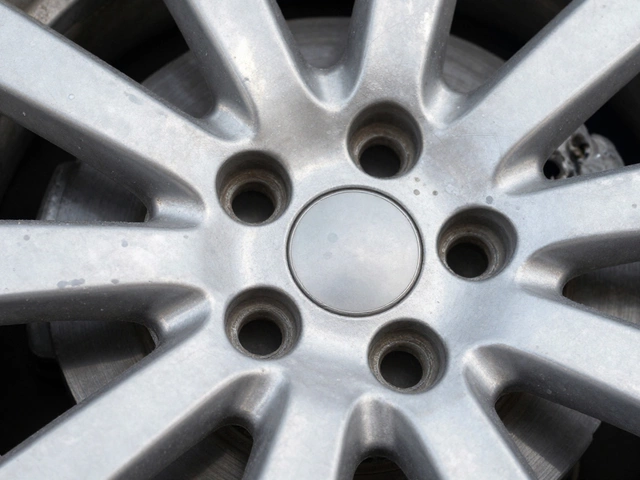If you've ever admired a car's sleek look, chances are you noticed its wheels. Alloy wheels have become a popular choice among car enthusiasts and everyday drivers alike, praised for their aesthetic appeal and performance benefits. But are they truly worth the investment? Let's embark on a journey to explore the ins and outs of alloy wheels, uncovering why they might just be the upgrade your car needs.
Alloy wheels aren't just about looks. They're crafted from aluminum or magnesium alloys, offering a blend of strength and lightness that can transform how a car handles. This magic mix results in not just a prettier face but a vehicle that performs better on the road. That said, alloy wheels aren't without their considerations and costs. So, is the investment justified? Stick around to find out, as we delve into the benefits, potential drawbacks, and everything you need to know to make an informed decision.
- Understanding Alloy Wheels
- Advantages of Alloy Wheels
- Potential Drawbacks
- Choosing the Right Alloy Wheels
- Maintenance Tips
Understanding Alloy Wheels
When it comes to car personalization and performance, alloy wheels stand in a league of their own as an enticing option. These wheels are distinct from their steel counterparts, being crafted from a refined blend of aluminum or magnesium alloys. This combination not only brings a lighter weight to the table, important for improved vehicle dynamics, but it also allows for an intricate design process. Alloy wheels can feature a variety of artistic and sophisticated designs, providing a canvas for customization that steel wheels simply cannot match.
The difference in materials leads to significant implications for vehicle performance. A lighter wheel reduces the vehicle's unsprung weight, which is the mass not supported by the suspension. This reduction can sharpen steering response, enhance acceleration, and improve fuel efficiency. Such performance enhancements make car upgrades with alloy wheels an attractive option for the savvy driver. As one automotive engineer noted, "Switching to alloy can transform how a car feels on the road — it's like upgrading an athlete's shoes from sneakers to cleats."
Beyond performance, the thermal conductivity of alloy wheels also plays into their advantages. These wheels dissipate heat more effectively than standard steel options. This is a crucial trait, especially under extensive braking scenarios such as driving downhill or during heavy traffic conditions. By maintaining lower temperatures, alloy wheels help to prolong the lifespan of brake components, ensuring that your ride stays not only smooth but safe.
As with any vehicle enhancement, understanding the balance of pros and cons is essential. While alloy wheels are known for their superior aesthetics and enhanced driving dynamics, they can be more prone to cosmetic damage. Their intricate designs, although visually stunning, make them susceptible to scratches and require careful maintenance. This brings us to the decision-making crossroads of whether an investment in alloy wheels is warranted for your specific driving needs and lifestyle.
The landscape of alloy wheels is vast, with options to cater to different preferences and vehicle types. Whether you're looking for something sleek and minimalist or bold and attention-grabbing, there’s likely an alloy wheel design that fits the bill. However, the allure of wheel investment shouldn't overshadow practical considerations. Think about your car's primary use — whether it's for city commuting, long rural drives, or spirited track sessions. Each scenario demands different properties from your wheels, which plays a crucial role in their suitability.
Advantages of Alloy Wheels
When it comes to elevating your vehicle's performance and aesthetics, opting for alloy wheels can be a game changer. These wheels are renowned for their distinct style, often giving cars a more modern and sleek appearance compared to traditional steel wheels. But the benefits are not skin-deep. Their inherent lightweight nature plays a crucial role in enhancing a car's agility and handling capabilities, which can make a significant difference in driving dynamics. Reducing the unsprung weight of your vehicle means better acceleration, improved fuel efficiency, and quicker stopping power when brakes are applied. These factors contribute to a smoother and more responsive driving experience, transforming how the car behaves on different terrains.
Alloy wheels also offer superior heat dissipation, which is a vital factor for any avid driver. During long drives or high-speed journeys, brakes can heat up considerably, potentially affecting performance. The materials in alloy wheels allow for better thermal management, dissipating heat more effectively and thus minimizing the risk of brake failure. This attribute not only ensures a safer drive but also extends the lifespan of your brake components. In many cases, this can result in cost savings over time, as frequent maintenance and replacements of brake parts can be avoided.
Another appealing feature of alloy wheels is the extensive design options available. They come in a plethora of finishes, patterns, and sizes, allowing you to customize the look of your vehicle to reflect personal taste or meet specific needs. This combination of functionality and form makes alloy wheels a popular choice for those eager to make a statement while also aspiring for practical benefits. In fact, as automotive journalist John Voelcker once noted,
"The appeal of alloy wheels lies in their ability to sufficiently balance aesthetic allure with genuine performance enhancements."
The benefits extend beyond performance and aesthetics. In regions where road conditions might not always be ideal, alloy wheels generally provide greater durability against the elements and road hazards. Their better resilience can translate into fewer damages compared to standard steel wheels, saving headache and money often associated with wheel repairs. And while durability might mean more upfront investment, the reduced need for replacements over time enhances the value proposition. For those concerned about long-term car maintenance, alloy wheels are often seen as a cost-effective choice.
Empirical data also supports the standing of alloy wheels in the automotive realm, as showcased in a survey conducted by Motor Enthusiast Magazine. This study illustrated that 70% of participants reported improved satisfaction with vehicle performance following the installation of alloy wheels, while also noting a distinct improvement in driving comfort. Such statistics reinforce the advantages often experienced by drivers who make the switch to alloys, showcasing why they're a beloved addition for both daily commutes and spirited drives.

Potential Drawbacks
Alloy wheels have captured the attention of many with their appealing aesthetics and driving benefits, but it's not all sunshine and rainbows. One of the key concerns with these wheels is their cost. Investing in high-quality alloy wheels can run up to several hundred dollars per wheel, which can be a hefty sum for those on a budget. The material and craftsmanship that contribute to their performance benefits also translate to a higher price tag compared to standard steel wheels. Whether the allure of style and enhanced driving performance outweighs the cost is a personal decision car owners must deliberate.
Another hiccup with alloy wheels is their vulnerability to damage. While they do offer a lightweight advantage, this also means they're prone to bends and cracks when faced with road hazards like potholes. Unlike more durable steel wheels, alloy wheels can suffer more significant damage upon impact, leading to potential safety risks and additional repair or replacement costs. The aesthetic appeal of alloy wheels also requires careful maintenance since scratches and curb damage can compromise their shiny, sleek appearance.
Some car owners are also intimidated by the specific maintenance requirements of alloy wheels. If not treated properly, the tarnish-resistant properties of alloy wheels can deteriorate, affecting their shine and appearance. Regular cleaning becomes essential to prevent oxidation and maintain their appearance. This is selling a car with well-maintained alloy wheels could attract better offers, but maintaining them requires diligence and time.
There are also concerns regarding compatibility and aftermarket considerations. When choosing aftermarket alloy wheels, car owners should ensure that the wheel's size and dimensions are appropriate for their vehicle to avoid handling issues. Incorrectly fitted wheels can lead to diminished driving performance and pose safety risks. Additionally, opting for unique designs might limit tire choices, complicating future replacements.
A study from the Auto Care Association indicated that improperly fitted alloy wheels could lead to a 10% decrease in fuel efficiency, reinforcing the importance of selecting the right wheel size.
Finally, alloy wheels can sometimes affect the comfort of your ride. The improved handling they provide might come at the expense of a smoother driving experience, especially on uneven terrains. The stiffer ride quality can be less forgiving on rough surfaces, which might be a consideration for drivers prioritizing comfort over performance.
Choosing the Right Alloy Wheels
When it comes to finding the perfect alloy wheels for your vehicle, the quest is much more than just selecting a design that catches your eye. It’s about blending functionality with aesthetics, ensuring that the wheels don't just look great but complement and enhance your vehicle's performance. This isn’t merely a superficial upgrade; it's a decision that can impact everything from fuel efficiency to braking dynamics. Before you jump into the vibrant world of car upgrades, it's essential to start with an understanding of your specific needs and expectations, as well as your car's requirements.
The first step in selecting suitable alloy wheels involves comprehending the various types available. Alloy wheels come in a myriad of designs and finishes, including polished, painted, and machined. Each finish offers distinctive benefits; painted options provide excellent protection against weather elements, while polished finishes add a shine that catches the sun’s rays in spectacular fashion. It's also vital to consider the wheel’s size and offset, as these characteristics determine how your vehicle handles the road. A larger wheel can improve grip and potentially enhance performance, though it may slightly compromise ride comfort due to reduced tire sidewall height.
The second factor is weight. The lighter the wheel, the less unsprung weight your car has. This can improve both acceleration and braking, contributing to a more agile driving experience. To find the right balance, research specific models and seek advice from experienced professionals or automotive enthusiasts. Many drivers have shared their insights in forums and reviews, which can be valuable resources for those venturing into new automotive enhancements.
“A well-chosen set of alloy wheels should act as the perfect accessory for your car, boosting performance and aesthetics in equal measure,” says automotive expert Ian Brundle.
Compatibility checks rank next in importance. Ensure the wheels you choose are compatible with tire sizes that are readily available and suitable for the environments you drive in. For example, if you're driving mainly on well-maintained city roads, opting for high-performance summer tires could be ideal. In contrast, those who frequently switch between terrains might consider a multi-season option. Check that the new wheels do not rub against suspension components by verifying clearance. Sometimes, this might require test-fitting a single wheel before committing to the full set.
Lastly, don’t underestimate the significance of personal taste and style. Traditional car enthusiasts might favor classic designs, while those pursuing a modern vibe could lean towards intricate spoke designs with a sleek black finish. It's often said that wheels are the jewelry of the car. Indeed, they can make or break the desired aesthetic, either blending seamlessly with the vehicle's body or boldly standing out. A well-thought-out wheel choice can infuse a unique personality into your car, turning heads every time you hit the road.

Maintenance Tips for Alloy Wheels
When you've invested time and money into acquiring those sleek, gleaming alloy wheels for your car, taking proper care of them is essential to ensure they deliver not only in looks but also in lasting performance. Regular maintenance is not arduous but a commitment to keeping your vehicle in its best shape. First and foremost, cleaning is crucial. Dust and grime can quickly build up, especially in urban areas. Use a gentle, pH-balanced soap mixed with water and a soft-bristle brush to prevent scratching the surface of the wheels. It's advisable to clean the wheels at least once a month, or even more frequently if you're driving in harsh conditions.
Another key aspect of maintenance is checking wheel alignment and balancing. Misalignment can lead to uneven wear, reducing the lifespan of your cherished wheels. Make a habit of observing any signs of uneven tread wear or pulling to one side while driving, as these are usually indicators of alignment issues. Regular checks will not only keep your vehicle in top shape but also ensure a smoother, safer ride. Tire pressure is another critical factor. Underinflated or overinflated tires can affect the performance of alloy wheels and fuel efficiency. Make it a routine to inspect the tire pressure at least once a month. As the seasons change, remember that temperature fluctuations can lead to varying pressure levels.
"The secret to long-lasting wheels isn’t just in the wheels themselves; it’s about consistent care," suggests auto mechanic Jessica Ramirez from AutoPro Insights.
Let's not forget about protective coatings. Whether it's a wax, sealant, or ceramic coating, these create a barrier against dirt, brake dust, and harmful UV rays. Investing in a good quality coating can significantly extend the life and shine of your wheels. Applying the coating doesn't require a professional either; it can be a DIY task over a weekend. Simply apply the product with a microfiber cloth, following the manufacturer's instructions.
It's equally important to keep an eye out for damage such as scratches or chips. Small superficial blemishes are mostly aesthetic issues but shouldn't be ignored since they can lead to more significant damage over time. For minor cosmetic issues, wheel touch-up kits are available in automotive stores that can help you keep your wheels looking pristine. However, if you notice substantial damage, consulting a professional is the best course of action to prevent any structural compromise.
Finally, seasonal care plays a significant role if you live in areas with harsh winters. Road salt can corrode the finish on alloy wheels, so extra attention is necessary during these months. Regularly rinsing the wheels with water, even when you aren't able to clean them thoroughly, can help remove corrosive salt. Adding these steps to your car care routine can ensure that your investment in alloy wheels remains a wise one, delivering style and performance for years to come.






